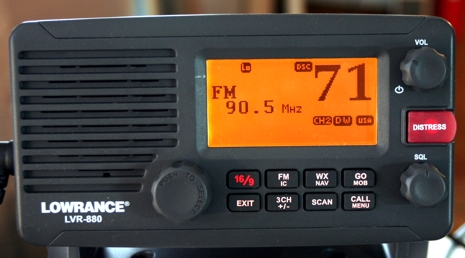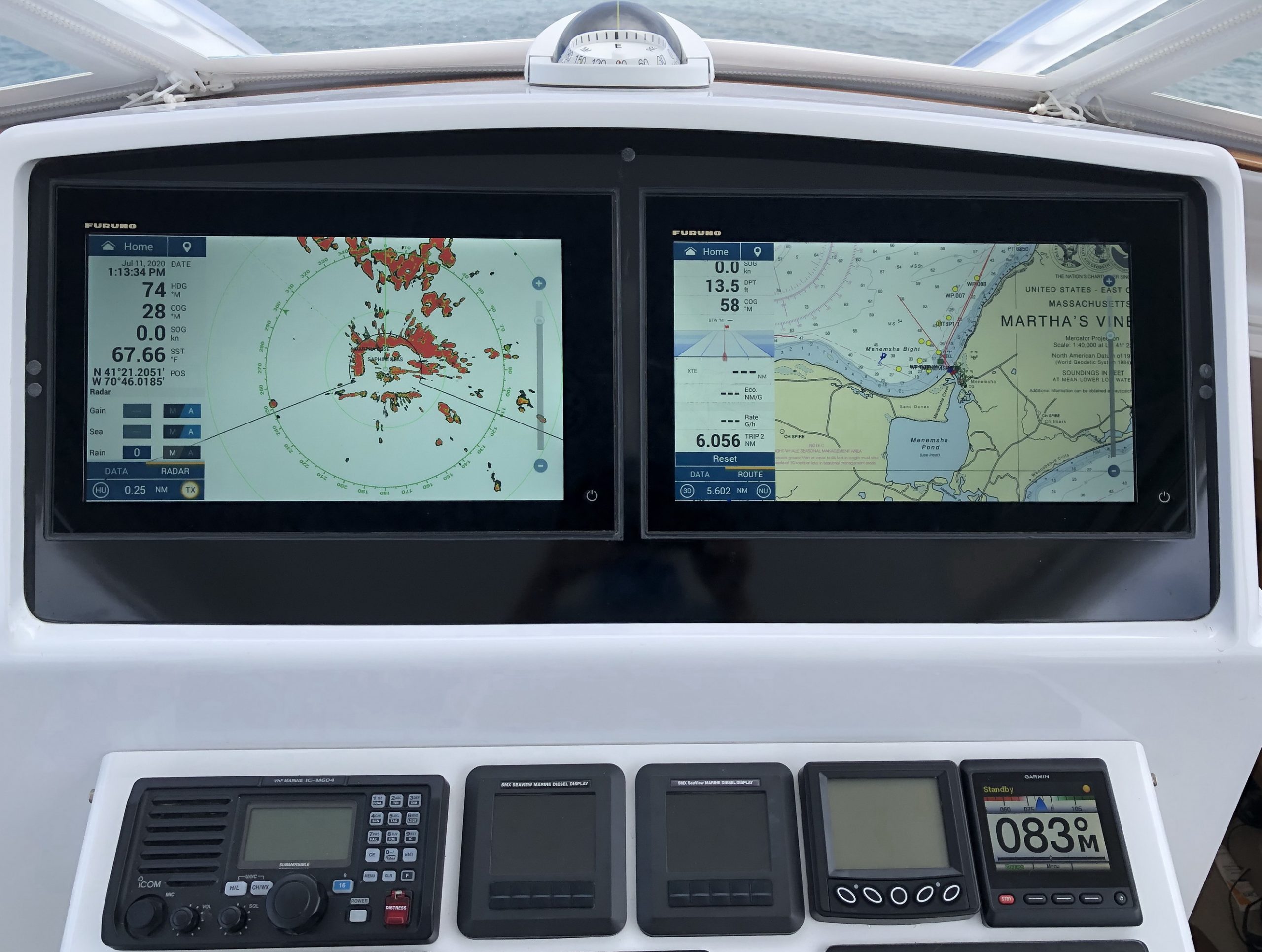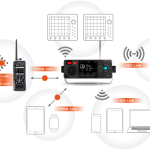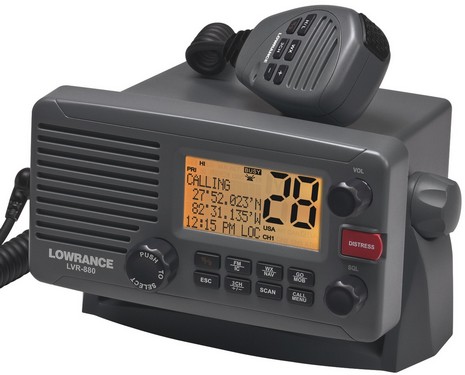MAATS Innovations, the winners are…

There were 15 entries in the “Aftermarket Electronics, Electrical Equipment, Instrumentation, Navigation Equipment including Software” category of this year’s MAATS Innovation Awards, and not a dud in the bunch! Which is why it’s particularly noteworthy that we seven judges gave the award to Lowrance’s Broadband Sounder and an Honorable Mention to Lowrance’s LVR-880 VHF/FM radio. I’ll be writing more about both these products as I should have samples installed on Gizmo in a week or so. The photo above is from a pre-production 880 that I tried in the lab for a month or so; the NMEA 2000 DSC features weren’t yet ready for prime time, but I was quite impressed with how well it could bring in FM radio while also scanning one, two, or all VHF frequencies, muting the FM whenever squelch was broken. Congratulations, Lowrance!
And there were other winners with electronics in them. Delta T Systems won the “Interior Parts” category with a DryBoat dehumidifier that uses “thermotronic” ceramic technology that just might revolutionize all aspects of boat air management. In the “Safety” category, Aqualuma won with a cleverly engineered jet ski LED “brake light” that might help those dudes to avoid running into each other, and ACR got Honorable Mention for the iPro EPIRB discussed yesterday. Some nifty non-electronic boat gear won awards too—like the Wrino boat hook—as you can read about in the Awards press release. And, finally, the caption for today’s vision of Vegas: bemused and be-crocked judge finds solace in HIS presence…














Having spent the last few summers working as a skipper down in the Caribbean I encourage everyone to AVOID DSC radio’s like the plague, unless you personally have had a chance to test them out.
For those of us used to monitoring channel 16 or keeping a working channel and 16 in a scan loop, modern DSC radios have a ring / distress feature which means that a couple of times a day you will be listening to a very loud and annoying ringing or alarm sound. Position request / Distress – no position data are the types of things you’ll see on the screen.
After running down below a few times, or having the crew yelling about the “alarm” a few times, the very very quick result is that the radio is turned totally off.
I doubt ANYONE with a dsc radio keeps them on overnight in a place like the Caribbean, and even during the day they go off.
I carry a personal handheld as well, which is thankfully DSC and alarm free. On a stormy night in a crowded anchorage I can sleep with it, and find I wake nicely if there is chatter, but easily go back to sleep if its not urgent without waking the whole boat. When sailing in a flotilla I can likewise leave our working channel open at night. If something comes up I was instantly available. This general watchstanding type principal really saves lives. In the flotilla especially, you will be called once or twice over the course of a week. Small fire, lost dinghy etc.
When someone is going a long way in a small dinghy it is trivial to leave a non-DSC radio on. Otherwise the folks back on the boat turn it off as soon as it alarms for the first time.
The EPIRB community has developed an excellent and reliable product. The DSC community seems to have truly crippled theirs.
It takes about 2-3 alarms before people turn these radios off. I worry that crews used to ignoring the DSC alarms, may not report something like a bilge water alarm.
I had the experience of an autopilot losing heading in rough seas and reverting to standby. The crew asked me how to turn off the alarm rather than getting the boat pointed in the correct direction.
The company chartering the boats also simply suggested turning the radios off.
I’m curious if others have had alarm heavy DSC experiences. Are the alarms required in the radio’s? Does anyone make a radio where the alarms can be disabled?
I know calling out the “safety” experts can sometimes be hard, but sometimes we need to point out when the emperor has no clothes.
Ben;
I just received a LVR-880 today, and with any luck, I’ll get it installed on the boat this weekend. I am really interested in the FM/VHR operation. I scaned the maual and did not read anything about it aoutmatically squelching the FM with a radio call comes through. What I would love to do is install the radio with stereo speakers for the FM in the cockpit, and use them for VHF as well. I wonder if that would work. THe limiting factor may be the 2w output, it seems like that owuld be really low for any fm listening other than talk shows or light music. I don’t want to blast the high seas, but sometime you need a bit of volume to overcome the engine when motorsailing, or the wind when it picks up. Any opinions on this idea? Could I put a in-line amp to make up for the low wattage, like the Poly Planar one for an MP3 player (50w)?
Thanks as always for the great blog!
Chris
John, It would be useful if you stated exactly what model radio(s) are putting off all these alarms, because I’ve never heard of such a problem. I have one or more of several model DSC VHF radios on a lot here in Maine, where there’s a fair bit of traffic, and I’ve NEVER heard a DSC distress alarm. Which suggests to me how tragically underutilized the feature is.
Let me clarify some things about DSC. One, you can not buy a non-DSC fixed VHF unless it was designed quite a long time ago, before DSC was mandated. Two, a DSC radio should only alarm loudly when it gets a distress call, which it’s supposed to do. There are exceptions, and this LVR 880 seems to be one (in preliminary testing), but non-distress DSC calls generally ring like a phone, not whoop like a fire alarm.
Besides, almost all non-distress DSC calls–and ALL position requests—are made to specific MMSI numbers, or Groups of numbers. Which makes me wonder why you are getting annoying “position request” calls, apparently from people you don’t know. Please detail your DSC problems further.
Chris, I’ve got the production LVR 880 installed in the lab now, and it will definitely do what you want, playing stereo FM either directly through speakers or via a stereo or powered speakers. I’ve mostly done the latter, using a pretty good Cambridge Soundworks speaker system, and it sounds great. When VHF transmissions cut in, their volume seems to match the FM well.
I’ve already tested a lot of the 880’s DSC functions, like individual calling and position requests, both to and from, and the results are dicier. Some worked consistently, some inconsistently, and some not at all. Am researching further.
Also neither the Garmin 5212 or the E-120 seem to understand the DSC messages going out on the NMEA 2000 network, and I’m told that even the Lowrance LCX can’t either. I’m sure they’ll all catch up eventually; so it goes when you have almost the first N2K VHF available (there is a Simrad but it’s very high end).
I have also never heard a DSC distress on our VHF in New England or Bermuda, but when a cadet on a RORO ship crossing the Atlantic we had the GMDSS (similar to DSC, but for HF) alarms going off every half hour or so. We were required by law to keep them on, and so we had to deal with it, but if allowed I am positive the crew would have shut it off. Maybe in the Caribbean people are putting off DSC distress calls all the time, but it does sounds like his radio is alarming at things it shouldn’t.
It is reassuring to hear that the experience is not common. But it really just takes 1-2 false alerts to kill the radio, no one can put up with it with the sound of the alarm they have 🙂
I came across plenty of info on the issue. It seems especially in the HF bands, DSC false alerts are a significant issue.
“The U.S. Coast Guard urgently requests your cooperation in managing and reducing the
increasing number of GMDSS MF/HF DSC false distress calls and unnecessary relays.”
Or here: http://www.gmdss.com.au/flaws2.htm
“out of 1200 alerts only 2 were genuine”! That means that someone pressing a button somewhere scrambled resources 1,198 times for no reason.
Can’t say I’m that surprised.
This directly maps to my experience in the Caribbean with DSC on VHF. I was on 4 different boats, and had the problem with each one to various degrees. Maybe misuse of DSC (very possible), but my impression after looking at the screens was that the radios “ring” or “alarm” far too often. Ie, routine calls people are making perhaps with misset destination or origination MMSI’s. Position requests etc.
When hailing a ship, how do you know its MMSI? You don’t. So instead, you have to try and “ring” all ships on some alert level and then ask for the big containership heading past bouy x to be aware that a boat is adrift ahead. Meanwhile, everyone has had their DSC radio’s alarm. And supposedly are trained enough to check for requested acknowledgment method etc.
Voice used to be so easy, you just got on 16 and hailed the “large containership passing below x bridge.”… Watchstanding meant they pretty much would always come on. If not, a voice hail to VTS or similar or a switch to the VTS channel would alert traffic control to the issue.
I guess I’ve just had really good success with voice, and if DSC means the sleepaboard / cruisers and others who aren’t by law required to monitor turn their radios off, it’s going to be sad.
Not to beat this to death, but another example of someone being bothered.
http://newsgroups.derkeiler.com/Archive/Uk/uk.rec.sailing/2007-09/msg00119.html
Here it was every 15 minutes or so. In San Francisco, it’s common to have safety messages every 30 minutes (floating debris etc). Be prepared for repetition of alerts which can NOT be silenced except as this mariner describes, by turning of your radio entirely.
It’s also pretty clear to me that manufactures will alarm on even regular all-ships safety related messages. It’s going to take a while, but at some point people are going to realize that keeping the alarm much more limited to distress message only situations is the way to go.
Until then, prepare for the above situation as these radios are introduced.
In case a radio manufacturer is listening, my preference would be
– a user option for a single beep or silence on “safety” classed DSC traffic.
– a user option for a single beep or silence on any “position request” type traffic at routine, urgent or safety levels. Never alarm on these.
– user option to disable and / or reduced volume or duration for the “distress” alert, but it should default to a proper alarm and volume. If an area if experiencing high false alerts this is critical.